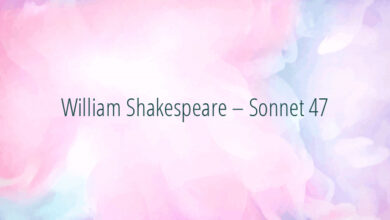
William Shakespeare – Sonnet 61
Is it thy will, thy image should keep open
My heavy eyelids to the weary night?
Dost thou desire my slumbers should be broken,
While shadows like to thee do mock my sight?
Is it thy spirit that thou send’st from thee
So far from home into my deeds to pry,
To find out shames and idle hours in me,
The scope and tenor of thy jealousy?
O, no! thy love, though much, is not so great:
It is my love that keeps mine eye awake:
Mine own true love that doth my rest defeat,
To play the watchman ever for thy sake:
For thee watch I, whilst thou dost wake elsewhere,
From me far off, with others all too near.
The main burden of this sonnet seems to be ‘Why do you torture me so?’ and to a large extent the poem has to be read in reverse. For initially the suggestion is made that the beloved sends out spies to pry jealously into the poet’s activities, but by the time we reach the end it is the writer himself who is staying awake, watching and imagining every move his beloved makes in an anguish of jealousy. Yet it is never quite stated this way, and the poet claims that his love is so much greater than the youth’s, and it is that which keeps him awake, not the youth’s love for him. And he lies awake like a watchman, protectively, so he claims, but the last line makes all too clear that it is not pure, disinterested love that keeps him awake, but the consuming fire of jealousy: an awareness that the loved one is far away, enjoying himself, with others close at hand, in his company, delighting in him, giving him pleasure, doing heaven knows what.
That is the image which keeps the poet awake, hovering forever in front of his wakeful eyes, disturbing his rest, giving him nightmares. And in the end he becomes just as pruriently keen on spying out the shames and idle hours in his beloved as he supposed the beloved was keen to do to him in the opening octet.
The balance of the poem is therefore complete, with the supposed or tentatively guessed at spying activities of the beloved (described in the octet) transmuted into the hideously jealous agony of the lover as he passes the long hours of the night imagining the worst horrors of the youth’s unfaithfulness.
It is also worth noting that this sonnet continues the analysis of jealous watchfulness initiated in 57 and 58, (see note to line 6 below), confirming the insertion of Sonnet 60 as a set time-piece.
The 1609 Quarto Version
IS it thy wil,thy Image ſhould keepe open
My heauy eielids to the weary night?
Doſt thou deſire my ſlumbers ſhould be broken,
While ſhadowes like to thee do mocke my ſight?
Is it thy ſpirit that thou ſend’ſt from thee
So farre from home into my deeds to prye,
To find out ſhames and idle houres in me,
The skope and tenure of thy Ielouſie?
O no,thy loue though much,is not ſo great,
It is my loue that keepes mine eie awake,
Mine owne true loue that doth my reſt defeat,
To plaie the watch-man euer for thy ſake.
For thee watch I,whilſt thou doſt wake elſewhere,
From me farre of , with others all to neere.
Commentary
1. Is it thy will, thy image should keep openIs it thy will = do you desire that;
thy image = the image of you (which is ever present in my thoughts)2. My heavy eyelids to the weary night?heavy eyelids = eyelids which are heavy with sleep.
weary – reinforces the idea of tiredness and need for rest. The night that must be endured is weary and long.3. Dost thou desire my slumbers should be broken,broken, open – what might be termed, in Wilfred Owen’s phrase, an oblique rhyme.4. While shadows like to thee do mock my sight?shadows like to thee – images or ghosts or spirits of you, or like you. They are images which the poet’s imagination creates. They mock his vision because they are not real, but give the impression that they are so. They also mock his sight (his eyes), as he desperately tries to close them in sleep. Within the sonnet tradition, and in neo-Platonic philosophy generally, there was much discussion of the shadow/substance duality.5. Is it thy spirit that thou send’st from theespirit = ghost, apparition. But it could also mean character, desire. ‘Is it your wish to send abroad to pry into my doings?’6. So far from home into my deeds to pry,into my deeds to pry – much of the language of this sonnet recalls that of 57 and 58, watching the clock, questioning with jealous thought, the hell of waiting, the far off absence of the beloved’s liberty. See sonnet 58.
into my deeds to pry = to scrutinise minutely and pruriently all my doings.7. To find out shames and idle hours in me,shames = shameful behaviour, sins, deeds of which one might be ashamed.
idle hours = time spent in idleness, by implication time ill spent. A common proverb was ‘the devil finds work for idle hands’.8. The scope and tenor of thy jealousy?
POR. Take thrice thy money. Bid me tear the bond.
SHY. When it is paid according to the tenour.
It doth appear you are a worthy judge;
You know the law. MV.IV.1.229-32.
Where a legal interpretation is clearly required.
I therefore suggest an alternative meaning of this line: ‘Is this the extent of the power and right to jurisdiction that your excessive jealousy claims over me?’9. O, no! thy love, though much, is not so great:Here the poet takes a backward step, and accuses himself of jealous watchfulness. He manages to make a virtue of it by insisting that it is the greatness of his love which forces him to remain wakeful, rather than any jealous impulses. But these impulses are all too apparent from the previous lines, and reappear again in the closing sestet.10. It is my love that keeps mine eye awake:My love and mine own true love, in the next line, although ostensibly referring to his love for the youth, could also be taken as the youth himself. Thus, as SB observes, ‘the lines contain a reassertion of the very theory they deny’.11. Mine own true love that doth my rest defeat,that doth my rest defeat = that prevents me from sleeping. A reminiscence of 27, 28, 43.12. To play the watchman ever for thy sake:to play the watchman – the subject of to play is my love in line 10, and I in the next line. Thus ‘I take the part of a watchman, and keep watch over you’. A watchman was a sort of civic sentry who patrolled the streets at night. OED 4 gives : One of a body of men formerly appointed to keep watch and ward in all towns from sunset to sunrise. During the night they would call out the hour, and also the state of the weather.13. For thee watch I, whilst thou dost wake elsewhere,watch I = I keep watch, or guard (over you); I stay awake, remain sleepless. The latter was the most common meaning. The two meanings are here telescoped into one.
thoudost wake elsewhere = you remain awake and carouse somewhere else. The sense of to wake meaning to revel and carouse is found in
The king doth wake tonight and takes his rouse Ham.I.4.8,
where the reference is to Claudius and his boorish drinking habits.14. From me far off, with others all too near.
From me far off = far away from me.
others – other friends and companions, other potential or actual lovers.




